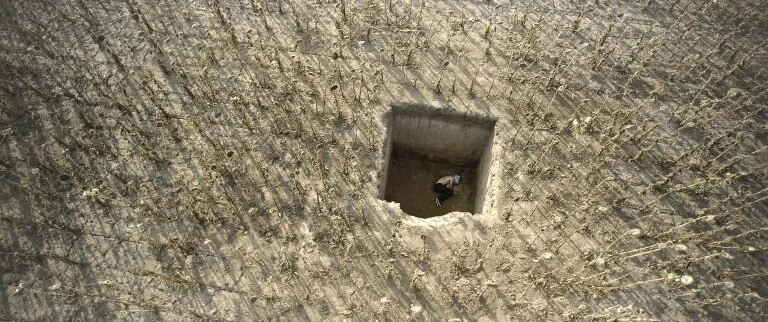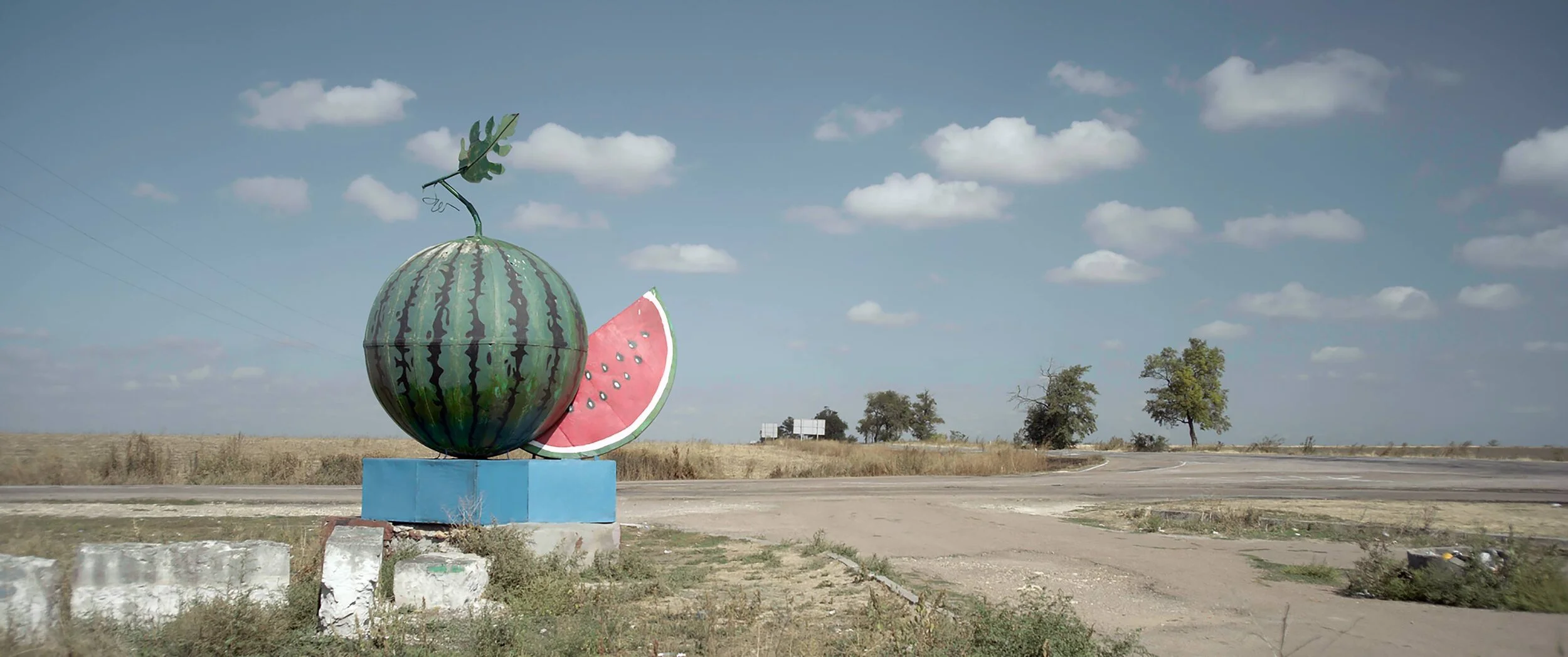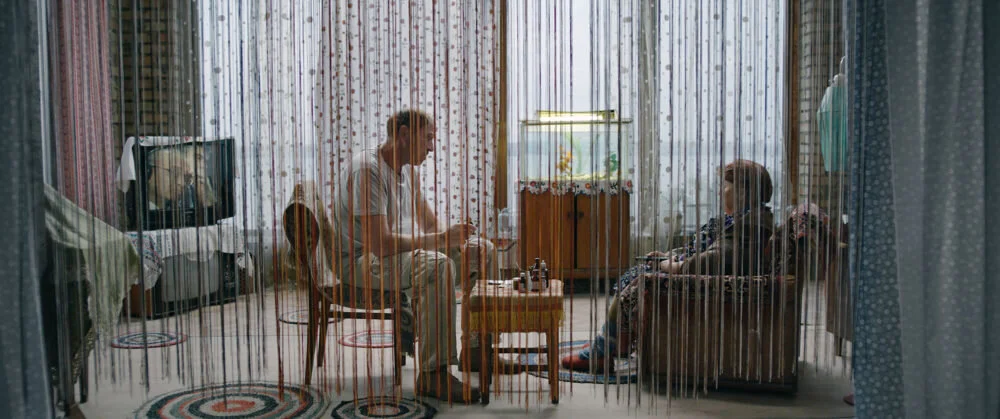KVIFF ’18: “All New Life is Born From an Explosion” – an interview with Volcano’s director Roman Bondarchuk
Roman Bondarchuk’s Volcano was our highlight at this year’s Karlovy Vary International Film Festival. The film was shown as part of the special programme “East of the West” – an international competition for first and second films by directors from Central and Eastern Europe, the Balkans, Greece, the countries of the former Soviet Union, as well as the Middle East. This is the first feature film by Roman Bondarchuk (Ukraine), who has already received international acclaim for his documentaries Euromaidan, Rough Cut (2014), Ukrainian Sheriffs (2015) and Dixie Land (2016). The documentary style of the film was also subtly emphasised by the film’s DOP – Vadim Ilkovy, recent recipient of the Jury Prize for the most innovative feature film at Visions du reel 2018 for his own film, My Father Is My Mother’s Brother. The cast of this film includes real local people and only two professional actors: Serzhiy Stepansky (Lukas) graduated as a sound designer, his works include The Tribe (2014), directed by Miroslav Slaboshpytsky, and it is his first acting role in Volcano; and Victor Zhdanov (Vova) – a theatre director and an actor who was born in a village in the Kherson region, where Volcano was made.
Film is set in the town of Beryslav, in the province of Kherson. The film’s plot gets underway when Lukas (a translator from OBSE) gets stuck in Southern Ukraine, or the Ukrainian steppe. Trying to act by his “urban” ideas of justice, good and evil, he fatally encounters a reality that lives by its own laws (or by their total absence). Here he meets with a local resident, Vova, who used to be the head of a workers’ fish farm, and now earns a living by picking up scrap metal. Lukas ends up at his house and is forced to stay, recovering from his first wounds caused by an unfortunate first encounter with locals, and, thanks to seemingly absurd situations, he comes to an understanding of some vital questions and, perhaps, his own destiny. The film’s plot rises from social commentary to a more profound philosophical statement about earth, man, and society. The story is permeated with philanthropy and sparkles with poetry in its striking visual allegories: from scorched earth with burnt sunflowers that look like thorns; to the underwater world of a sunken village, as well as in seemingly absurd situations: from the disappearance of the car carrying OBSE workers; the ‘Invincibles’ scene, very much not for the faint-hearted, in which an “original genre artist” inserts a working drill into his nose, to the singing female chorus that appears in the steppe – a mirage.
We caught up with the director to discuss how the film was created and its political context.
How much of the script of your film is invented and how much is documentary?
This script was built on a lengthy documentary study and real events. The only ‘fictional’ bit is the story with the OCSE – we needed an observer, since the entire scripted plan was built on our observations of Darya’s uncle (Darya Averchenko – writer and producer). Uncle was constantly coming up with crazy business ideas. Once he suggested digging up the bones of German soldiers from World War II in his garden and selling them to their relatives in Germany. This seemed so absurd to me that I decided to follow him with a camera to get a better understanding of his life and the area where he lived. We wanted to film the real Uncle Vova, but he died about six months before the shoot. We had to review our entire relationship with the film. And because I had observed the uncle for a long time, I had to transfer this story to observers, for example, the man from OCSE, who seems to us to be the other extreme of absurdity. The exact same thing, but in beautiful costumes and a nice car. I thought that if I observe my hero, then he should be similar to me in attitude, in age, this very same OCSE observer. That’s why I invited Serezha to try it out. That’s what we came up with, and everything else is reality, just as it is. For each story in the film you can find a basis in reality from which it grew – even for the mirage. My grandfather and grandmother, who lived in this area, saw these mirages. My great-grandmother told me that sunlight refracts in the desert and creates an optical illusion. And they said that under certain sunlight, after the rain, you can see a neighbouring village, where dogs and chickens run around and people move about. This went away when they planted an artificial forest, and then in later years people cut those down in order to heat their homes. And now there are no artificial plantations, and the mirages have returned.
Why did you choose to associate your story with OCSE? (An organisation for security and cooperation in Europe – an international mission to Ukraine aiming to to observe the military conflict and to control the situation in relation to agreements)
The OSCE mission is for me an embodiment of absurdity, much deeper than anything that happens in Beryslav. By the way, in Kiev, there was a head of an information agency, to whose house came a search party, and found on him a Russian passport, a medal for the liberation of the Crimea, a gratitude from Putin and some half a million dollars in cash. Now he has been convicted of high treason and there’s a trial going on. And the OSCE has assembled an international conference on the topic “How the rights of journalists in Ukraine are infringed”. You look at this and cannot understand what the OSCE is doing in Ukraine, nor with what mission they came.
How did you choose your locations and what defined your choice?
It is impossible to perceive the post-Soviet space portrayed by Western film directors. This type of cinema considers the superficial material reality, and it often looks hopeless. I mean to say that their position is that if, economically, everything is bad, then it is bad in all other respects. Here everything is the opposite, and at the same time people are ready to defend this land if necessary. And here is the question: what holds them there, and why? We spent a lot of time searching for locations; I think this was the biggest expedition, the greatest application of our forces. Because it is a space which should work and speak. And this is Vova’s house, which we spent ages looking for, like some kind of unrealised dream for a large family that must live there and for whom it is worth sacrificing everything. But you still never finish building it. We looked at many houses, and we had two criteria: a house with a future and a house with no future. That’s how we found Vova’s house, which had a tangible sense of future. And we filmed it. I think we wanted to do everything in a more documentarian manner, but thanks to these locations – in the early days we put the footage together and realised that it was phantasmagoria. It had become so much more saturated and multi-layered. It led us itself to some point in time. Because when you see in the frame some remnants of Greek civilisation, and you see a figure in the background who is not connected to this culture or time period in any way, but at the same time, it is all there, all at once, and thus is born the metaphysical. The club where we shot the “original genre artist” performance, the directress happily let us shoot there, in exchange for us hanging the curtains and slightly improving the look of the club. Everything that you see in the film was already there – the flag, the balls, the flowers – we simply put the finishing touches there.
Were there any absurd situations while you were filming?
There was a funny incident when we were driving around the area looking for a club – the ones we’d seen were all in a terrible condition. But we liked this club, although there were some black marks on the walls, and I asked why it looked so bad. The directress said “We had a tornado here.” And I said, “Interesting – how did that happen?” She replied, “Well, we all came to work and the tornado started, it went on and on, started pulling off the slate roof tiles, pulling it into the funnel. The attendant grabbed my hand and the door, and death/the tornado was blowing, the door was shaking, and he was holding on to it with one hand, and me with the other. So it didn’t blow us away. Here’s where the slate scratched,” she said, showing us her hand, which was covered in cuts. I said, “So was anyone else hurt?” The directress: “No, just the club. But I can understand this. It was built by communists from the remains of the church, so now the heavens are taking their revenge on us.” It’s so Marquez-esque when they believe in divine revenge… Then we went to the next club in the neighbouring village, and saw the slate roof was also blown open “Tornado?” I asked them. “Yes, tornado,” they replied.
The territory in the film – was it occupied?
This territory is officially Ukrainian (the border with Crimea). Putin had planned to seize it. His technologists, all these ideologists of the war, believed that there is a territory called the South-East. They were sure that Kherson, Nikolaev, and Donetsk were comprised of people of a common mentality, people who uniquely are pro-Russian. The idea was to grab all these territories in one fell swoop. And when this company started, they started from Donetsk and Lugansk, and the trains went all over Ukraine, (I don’t know what their proper name is), they were full of lumpenproletariats, they were going to wreak havoc and create the illusion of civil war. These trains contained journalists as well and there were all these other people with clubs, ready to spread disorder. They went from town to town – there were many investigations on this theme. Seemingly it was the same people in Lugansk, Donetsk and all the occupied places. Some even found photos on Facebook and compared details. But here’s the interesting thing – it is when these people reached Kherson in particular, that all the local residents came out onto the platform to meet them. Everyone came out – irreconcilable enemies, neighbours, people of different interests, teachers, shipyard workers – everyone came out with the all the bits of wood that they could find. Everyone went onto the platform, stood there, and the train stopped. They looked at each other for 5 minutes, and the train moved on. Because they saw that they would not get beyond the platform. Therefore these regions remained part of Ukraine, and there is no war there now. Moreover, there was a peak of civil activity in Ukraine’s larger cities. I can say that we now have an almost overly active society. For example, in Kiev, any question, any attempt to push us back, any attempt to reverse these reforms, all are growing into protests and demands for reporting. As far as the areas we shot for Volcano are concerned, this has unfortunately not reached that far yet. That is, there might not be any resources or government there, or there is no single position there either.
Where does the name “Volcano” come from? How is it linked with the content of the film?
It’s the name of the village in this area which are not called by the names that are written on maps, but by the names of the kolkhozes (collective farms in the Soviet Union). I like the duality of this term: there is something in the air, a tension and a volcano, just about to erupt. On the outside the hero in our story is successful – there are not many people who have such a job, car, dacha, and for whom everything is good, but its not quite enough. And our hero finally arrives at rock bottom, but is at the same time cured of some sort of blues, that is, in this paradox there is all this reality. It is also a conversation about when reality looks scary and hopeless – it hides really important things in itself. Because of all the dangers we’ve had to live through in Ukraine in recent years, people are used to adapting, says Vova – you adapt, you live, you don’t adapt, you don’t live. This is also part of the fact that it has already become something habitual, and that you need to eradicate in yourself. It seems to me that now is the time to review this concept. You need to develop, not adapt. Its an overarching goal – to build a new paradigm, and everything new, all these new ideas appear under pressure. Any new beginning, all life, is born from an explosion.
Translated from Russian: Felix White-Thomson




